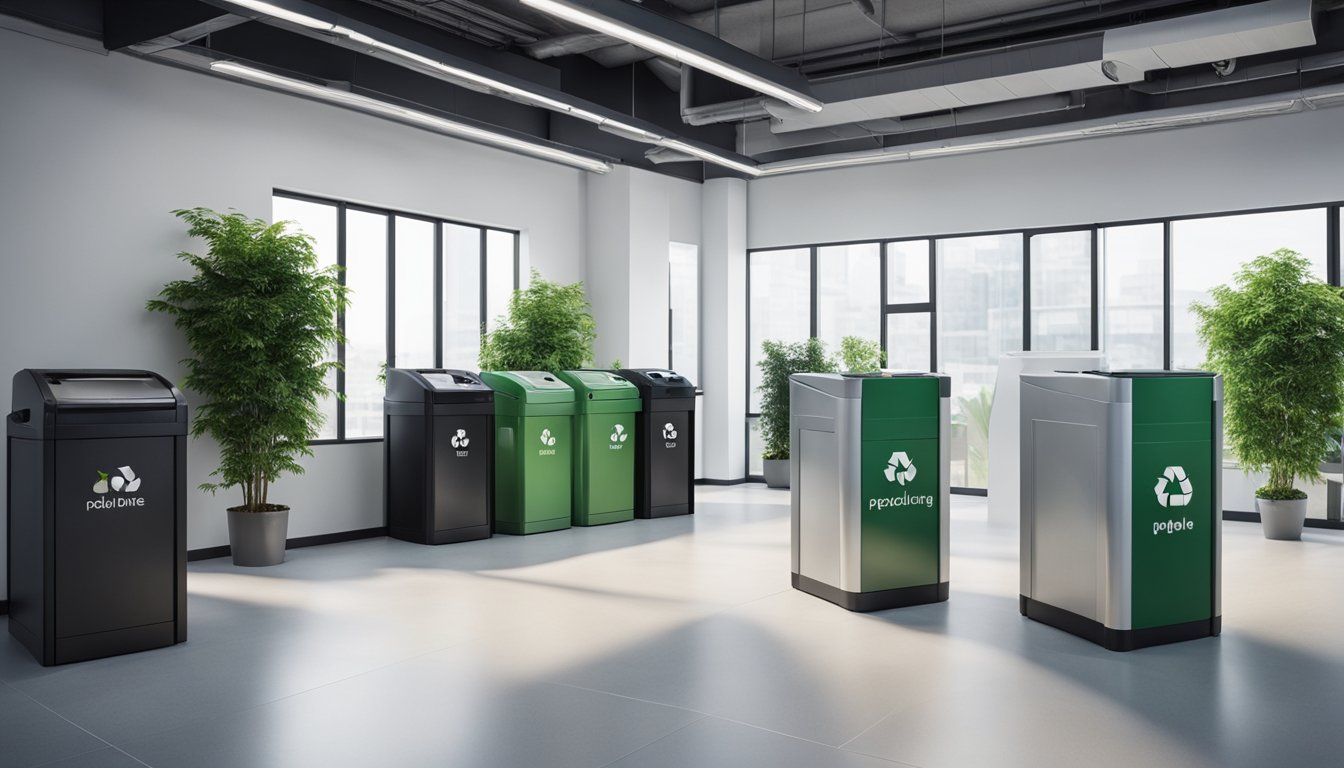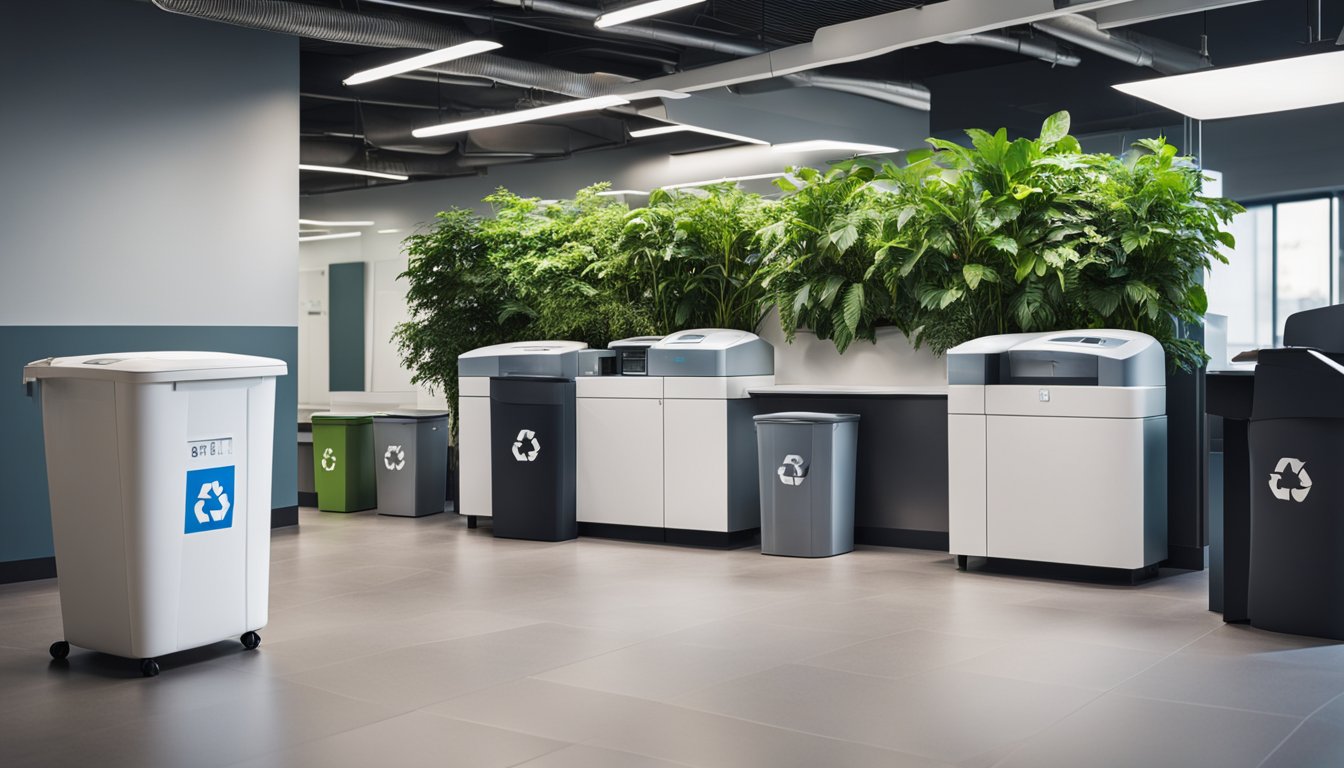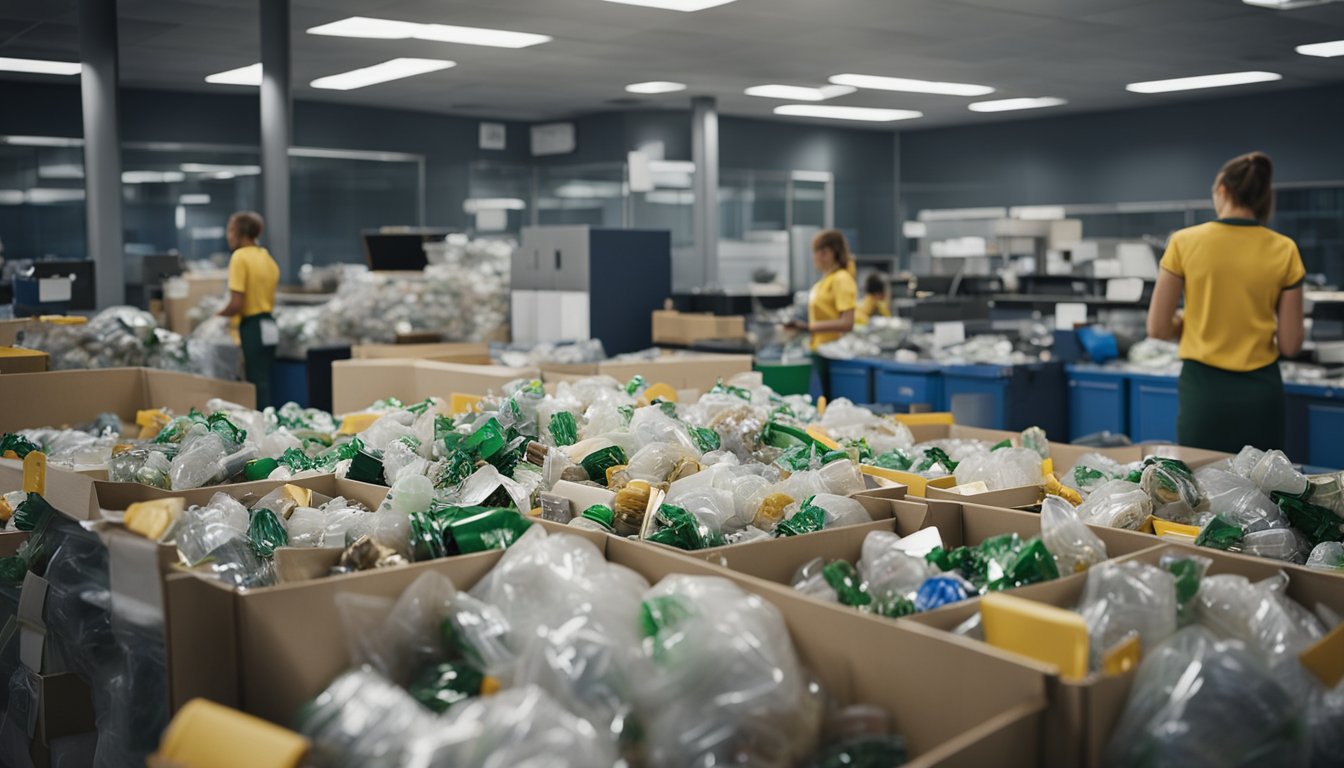Late updated: 17 Apr 2025 15:04
Written by: Sarah Hollister
Sustainable Office Recycling Solutions: Enhancing Workplace Efficiency
In today's rapidly evolving workplace, sustainable office recycling solutions have become not just beneficial but essential. More organisations are recognising the importance of reducing their environmental impact and are actively seeking ways to integrate eco-friendly practices into their daily operations. Implementing comprehensive recycling programmes can dramatically reduce waste and promote a culture of sustainability within the office. By adopting these measures, we contribute to a healthier planet while enhancing our corporate responsibility.

One effective strategy is to conduct an office waste audit to assess current waste management practices and identify areas for improvement. By doing so, offices can tailor their recycling initiatives to maximise efficiency and effectiveness. Many companies have found success by establishing a dedicated green team that champions sustainability efforts and encourages staff involvement. This approach fosters a sense of community and shared responsibility toward environmental stewardship.
Additionally, reusing and recycling office furniture and equipment through resale or donation can further advance sustainability goals. It not only minimises waste but also provides valuable resources to those in need. By consciously choosing sustainable office practices, we not only reduce our carbon footprint but also set a positive example for others to follow.
Key Takeaways
- Comprehensive recycling programmes reduce waste effectively.
- Conducting an office waste audit identifies key areas for improvement.
- Reusing furniture and equipment minimises waste and benefits communities.
Implementing Sustainable Office Recycling Solutions
Achieving sustainability in an office setting requires a multifaceted approach to recycling. We must focus on well-structured recycling programmes, the integration of composting systems, toner and e-waste recycling, and fostering community involvement.
Establishing Effective Recycling Programmes
Creating a robust recycling programme is essential in reducing office waste. The initial step involves conducting a comprehensive waste audit to identify key waste streams. This helps us tailor recycling efforts to address specific materials like paper, plastic, and metal. We then strategically place clearly marked recycling stations throughout the office.
Educating employees on acceptable materials through workshops or training sessions is vital. Regular monitoring and feedback can ensure compliance and highlight areas for improvement. Additionally, appointing a dedicated green team can help maintain momentum by organising new initiatives and addressing challenges as they arise.
Integrating Composting Systems
Incorporating composting extends our sustainability efforts beyond traditional recycling. Office composting systems handle organic waste, such as food scraps and compostable office supplies. Establishing designated collection bins for organic waste is the first step. It’s crucial these bins are easy to access, and clearly labelled.
Partnering with a local composting facility or using an onsite composting solution helps manage the collected material effectively. We should also educate employees on what materials can be composted, as this reduces contamination. Integrating a composting system promotes environmental benefits and underscores our commitment to sustainability.
Promoting Toner and E-Waste Recycling
Offices regularly generate toner cartridges and electronic waste. As these contain hazardous materials, proper recycling is critical. Establish a dedicated area for collecting used toner cartridges, and partner with responsible recycling companies that specialise in toner and e-waste recycling.
Facilitating regular collection events encourages employees to recycle obsolete electronics, preventing them from ending up in landfills. Offering convenient drop-off points makes it easy for our team to participate. Highlighting the environmental impact of improper disposal can motivate everyone to adopt more sustainable practices.
Encouraging Community Involvement
Sustainable initiatives gain strength when integrated into the wider community. Engage with local organisations and councils to enhance our recycling efforts. Forming partnerships can provide mutual benefits, such as shared resources or joint recycling programmes.
Organise community events that raise awareness about office sustainability practices, encouraging public participation. Involving local schools and businesses in educational campaigns can further amplify our office’s recycling impact. Engaging with the community not only strengthens our recycling programmes but also fosters a collaborative spirit in sustainability efforts.
Enhancing Office Sustainability and Reducing Environmental Impact

Creating a sustainable office environment requires vigilance and strategic efforts. Addressing product choices, energy usage, water conservation, circular economy practices, and remote working can significantly reduce our environmental impact.
Adopting Eco-Friendly and Sustainable Products
Incorporating sustainable products into our office environment can streamline our efforts to minimise ecological damage. Opting for recycled paper or tree-free materials reduces demand on natural resources. We should favour products that have been certified as eco-friendly by recognised organisations.
Office supplies such as pens, notebooks, and cleaning products can be replaced with those made from sustainable materials. Using refillable options instead of disposables helps eliminate waste. Encouraging procurement teams to prioritise environmentally certified vendors is also key. It's essential we actively contribute to a greener office setting.
Reducing Energy Consumption and Carbon Footprint
Energy efficiency is crucial for reducing our carbon footprint. One effective strategy is to implement motion-activated lighting, which can significantly cut down unnecessary energy usage in spaces that may be infrequently accessed. Upgrading to energy-efficient appliances and HVAC systems also plays a fundamental role.
Encouraging employees to unplug devices when not in use is another simple yet effective measure. Monitoring and recording our energy consumption provides insights that can drive further improvements. By taking these proactive steps, we can reduce our dependency on non-renewable energy sources, positively influencing our environmental impact.
Optimising Water Conservation in the Workplace
Water conservation is a critical aspect of sustainability. Installing low-flow fixtures in restrooms and kitchens can decrease water usage by a significant margin. Promotional campaigns or signs can remind employees to conserve water where possible.
Rainwater harvesting systems can supply non-potable water for specific alternatives, such as irrigation or toilet flushing. Conducting regular maintenance of plumbing systems ensures there are no leaks, averting unnecessary water wastage. By increasing awareness and making informed choices, we contribute to conserving this vital resource.
Supporting the Circular Economy
The circular economy is an invaluable model for sustainability, which centres on reuse and recycling. Establishing recycling stations with clear labelling for materials such as paper, glass, and plastics heightens our recycling rates.
We should facilitate partnerships with services that handle electronic waste responsibly, ensuring office equipment is either reused or recycled appropriately. Prioritising remanufactured or remanufacturable office machinery and consumables aids in reducing waste. By supporting these practices, we can close the loop on resource utilisation, creating a balanced system.
Embracing Remote Work and Virtual Meetings to Reduce Waste
Embracing flexible work arrangements such as remote work limits the dependence on physical office resources and reduces carbon outputs from commuting. Virtual meetings can replace many in-person sessions, diminishing travel needs.
Digital documentation minimises paper use, further shrinking our carbon footprint. Investment in reliable digital communication tools is crucial for maintaining productivity while being eco-conscious. Collective efforts to adopt these methodologies position us to lead by example in sustainability within the workplace.
Frequently Asked Questions

In creating sustainable office recycling solutions, we address several aspects of office waste management. Our focus includes recycling large office furniture, facilitating furniture giveaways, and exploring options for donating office equipment.
How can businesses effectively recycle large office furniture items?
Businesses can collaborate with local recycling centres. Many facilities offer collection services specifically for large items, ensuring proper disposal. Dismantling furniture prior to recycling can make transportation easier and increase the chances of recycling more components.
What are the best practices for facilitating office furniture giveaways?
Organising an internal or community event can simplify furniture giveaways. Advertise available items through email notifications or local community boards. Setting clear instructions for collection days and times helps ensure these events run smoothly and efficiently.
Can office equipment be donated to charities, and how should this be approached?
Many charities accept gently-used office equipment. It is crucial to check with recipients for specific needs and ensure equipment is in good working condition. Reaching out to local organisations in advance can facilitate a smooth donation process.
What options are available for environmentally responsible removal of unwanted office furnishings?
Companies can utilise specialised waste disposal services that focus on environmentally friendly methods. These services often dismantle furniture to maximise recycling. Additionally, some organisations offer pickup services dedicated to sustainably managing office waste.
How can non-profit organisations access free or low-cost office supplies?
Non-profit organisations can benefit from partnerships with businesses looking to offload excess supplies. Online platforms and local business networks can serve as conduits for these exchanges. Regularly checking listings can uncover useful opportunities for acquiring needed items at little or no cost.
What strategies can offices implement to minimise waste when updating or replacing equipment?
Prioritising refurbishment of existing equipment can significantly cut down on waste. In cases where new purchases are necessary, opting for products with warranties or upgrade options can extend the lifespan of office assets. Recycling programs for obsolete equipment should be a staple of office policies.
